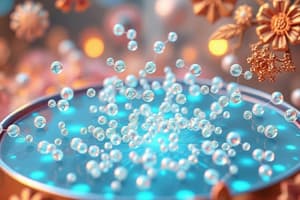Podcast
Questions and Answers
What method can be used to isolate viral DNA effectively?
What method can be used to isolate viral DNA effectively?
- Chemical extraction followed by evaporation
- Enrichment of virus particles through centrifugation prior to proteolytic digestion (correct)
- Electrophoresis to separate based on charge
- Filtration through a microfilter
Which type of centrifugation allows particles to reach their density isopycnic position?
Which type of centrifugation allows particles to reach their density isopycnic position?
- High speed centrifugation
- Isopycnic centrifugation (correct)
- Rate zonal centrifugation
- Sequential centrifugation
During the DNA extraction process, what role do proteases play?
During the DNA extraction process, what role do proteases play?
- They enhance silica binding
- They cause DNA fragmentation
- They release nucleic acids (correct)
- They degrade nucleic acids
What is a key difference in RNA isolation compared to DNA isolation?
What is a key difference in RNA isolation compared to DNA isolation?
Which centrifugation technique separates particles based on their size and sedimentation coefficient?
Which centrifugation technique separates particles based on their size and sedimentation coefficient?
What is the main purpose of using affinity chromatography in nucleic acid extraction?
What is the main purpose of using affinity chromatography in nucleic acid extraction?
What happens to nucleic acids under high salt conditions during extraction?
What happens to nucleic acids under high salt conditions during extraction?
Which of the following describes the composition of the solution before centrifugal separation?
Which of the following describes the composition of the solution before centrifugal separation?
What is the primary purpose of using phenol/chloroform in nucleic acid extraction?
What is the primary purpose of using phenol/chloroform in nucleic acid extraction?
Which of the following factors is NOT essential for precipitating DNA with alcohol?
Which of the following factors is NOT essential for precipitating DNA with alcohol?
What effect does shearing have on high molecular weight DNA during extraction?
What effect does shearing have on high molecular weight DNA during extraction?
How can circular DNA plasmids be isolated effectively after alcohol precipitation?
How can circular DNA plasmids be isolated effectively after alcohol precipitation?
What is the significance of EtBr intercalation in the context of DNA analysis?
What is the significance of EtBr intercalation in the context of DNA analysis?
What is a recommended precaution to avoid shearing high molecular weight DNA?
What is a recommended precaution to avoid shearing high molecular weight DNA?
Why is it important to purify plasmid DNA using a density gradient?
Why is it important to purify plasmid DNA using a density gradient?
What characteristic do fragments of DNA less than 10 kb exhibit regarding shearing forces?
What characteristic do fragments of DNA less than 10 kb exhibit regarding shearing forces?
Study Notes
Extraction of Nucleic Acids
- Phenol/chloroform used to remove proteins and hydrophobic components from the aqueous phase.
- Alcohol precipitation involves using 2.5 volumes of ethanol or 1 volume of isopropanol, along with high salt concentrations (e.g., 0.3 M sodium acetate) for DNA isolation.
- Desalting process employs 70% ethanol to eliminate low molecular weight hydrophilic contaminants.
Chromosomal DNA Isolation
- Chromosomal DNA can form large, viscous aggregates that are visible and can be spooled using a glass rod.
- Typically consists of very long strands, can fragment into 50-100 kb sizes, and is prone to shearing.
- To prevent shearing: Avoid small pipette tips and vigorous agitation.
- Gene diagnostics tools (e.g., PCR) remain effective with high-molecular-weight DNA despite shearing,
Circular DNA/Plasmids
- Plasmids exhibit diverse structures and conformations and are analyzed through DNA binding dyes like ethidium bromide (EtBr).
- EtBr intercalates into double-stranded DNA, affecting buoyant density based on DNA conformation.
- Plasmid purification can be achieved through isopycnic centrifugation in an EtBr-CsCl gradient, segregating particles based on density.
Cesium Chloride (CsCl) Density Gradient
- CsCl creates a linear density gradient during ultracentrifugation, enhancing separation efficiency.
- Macromolecules migrate to their equilibrium positions under sufficient ultracentrifugation forces without pre-forming the gradient.
Isolation of Viral DNA
- Virus particles are concentrated via centrifugation before proteolytic digestion or chemical breakdown.
- Employs multiple steps of sequential centrifugation at increasing g-forces to separate heterogeneous particles.
- Isopycnic and rate zonal centrifugation methods allow for further separation based on density, size, and shape of viral particles.
DNA Extraction Kits
- DNA extraction kits streamline nucleic acid isolation through standardized protocols.
- Nucleic acids are released using proteolytic enzymes and purified via affinity chromatography columns that preferentially bind negatively charged nucleic acids depending on salt and alcohol concentrations.
- RNA purification can occur simultaneously, and co-purified RNA can be subsequently digested with RNase.
RNA Isolation
- RNA isolation follows similar protocols to DNA extraction but requires specific precautions due to the high prevalence of RNases in cells, which can degrade RNA.
Studying That Suits You
Use AI to generate personalized quizzes and flashcards to suit your learning preferences.
Description
This quiz covers the methods of centrifugation, particularly ultracentrifugation, for isolating and purifying viral DNA and nucleic acids. It focuses on the use of cesium chloride and the enrichment of virus particles through sequential centrifugation processes. Test your knowledge on these essential laboratory techniques!




